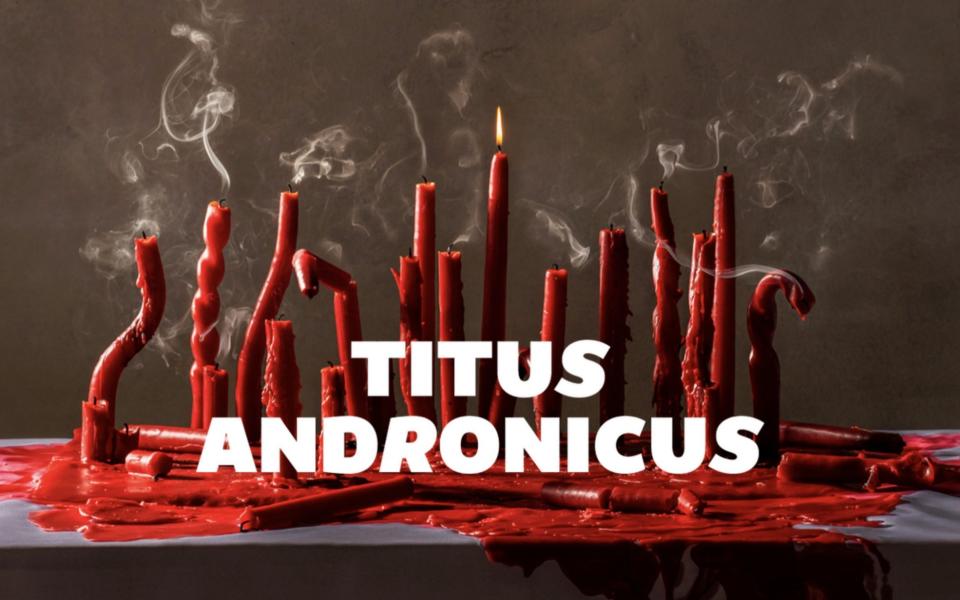Titus Andronicus actors will snuff out candles to spare audience sight of human violence

Shakespeare’s Titus Andronicus is so bloody that audience members have been known to faint at the violence, so the Globe has devised a gentler way for characters to snuff it on stage.
Actors in the theatre’s new production of the play will no longer pretend to attack each other in pools of fake blood, but will instead commit “murder” against candles.
These candles will be held by the many doomed characters in the play - which has a body count in double figures - and when their time has come to die these metaphorical lights will be snuffed out, avoiding the potential upset of person-on-person violence.
While this may spare any squeamish spectators, the candles themselves will be brutalised with more force than actors would be allowed to inflict on each other, being smashed to pieces with meat tenderisers and even melted with a heat gun.
The new symbolic approach comes after the Globe’s 2014 run of Titus during which around 100 audience members either fainted or left upset at the hyper-realistic gore on stage.

Jude Christian, who is directing the new all-female production set to run in 2023, has said that her candle concept “makes it less bad”, adding: “Watching a human pretend to stab another human can be upsetting.”
The show nevertheless comes with a trigger waiting for the “extremely upsetting” subject matter of the tragedy, which is not limited to “extreme violence and death, including bodily mutilations, cannibalism, rape and self-harm”.
Shakespeare’s 1593 play calls for 14 deaths and alludes to other off-stage barbarism, as Roman general Titus seeks revenge for the death of his children, including by putting the remains of two slain enemies into a pie which he then feeds to their mother.
Ms Christian had to devise a way to stage all this carnage in the Globe’s smaller Wanamaker theatre, which is usually lit by candlelight, and believes her symbolic use of candles will offer audiences the same levels of violence but in a different way.
She explained: “Each person will have a candle, a bit like the candles on your dinner table, a fairly long tapered candle. That is their light, and it will literally be snuffed out.
“Then imagine another character taking a meat cleaver, a meat tenderizer, and smashing that candle, spraying wax all over the room, to the point where performers may need to put on safety goggles and safety gloves.
“Imagine them throwing it to the floor or smashing it against a wall. It’s a different approach to violence. You have anthropomorphised that object, and it becomes, symbolically, that person who is being attacked.”
Wax will 'drip like blood'
Ms Christian has also suggested that heat guns might be used to melt the candles in another symbolically gruesome act of violence, as the wax would “drip like blood”.
She believes that the conceit of the candles will be shocking for audiences as they project characters on to the inanimate objects, and then see these “characters”, smashed against walls, hurled against the floor, and even slowly “suffocated” with jars.
She said: “This approach also allows actors to really go for and show all that rage, nothing has to be held back, they can do what they like. I think seeing that genuine emotion on stage will be very powerful.”
Ms Christian has floated the idea of wielding blowtorches against the candles, but said that while flying dry wax might be fun for audiences, hot wax would be a problem for health and safety.
There were concerns for health and safety in 2014 when Lucy Bailey brought Titus to the stage, and scores of people fainted during its summer run.
Ms Bailey told the Telegraph: “We viewed the piece as a kind of bloodsport. We had the idea to create a kind of temple of death, like a Roman arena.
“We had slaughtered characters able to fall off stage into the crowd, and of course we had squabs for fake blood. We tried to make the audience complicit.
“With the language on top of this, Shakespeare’s poetic language of grief, it was a really heady mix, and that caused people to keel over.”
Both Ms Christian and Ms Bailey have said that Shakespeare’s first tragedy Titus is often overlooked as a “juvenile” work because of a “sniffy” attitude that considers the play “just about gore”, but both directors believe that it has a strong message about violence and revenge and deserves a revival.

 Yahoo Movies
Yahoo Movies 